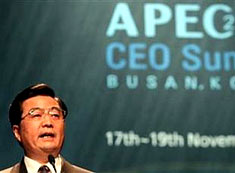
Chinese President Hu Jintao pledged on Thursday that China would make further contributions to a sustained expansion of global trade by changing the mode of foreign trade growth, increasing imports and enhancing the protection of intellectual property rights.
Delivering a speech entitled "An Open Mind for Win-Win Cooperation" at the Asia-Pacific Economic Cooperation (APEC) CEO Summit in South Korea's southeastern port city of Busan, the Chinese president said that although China had a trade surplus with some regions, the country had a deficit with the Asia-Pacific region.
Among China's top ten sources of trade deficit in 2004, six were in the Asia-Pacific region, and the deficit totaled US$127 billion.
"It is not true that China is seeking a big surplus in foreign trade. As a matter of fact, the enormous domestic demand and the broad internal market are the perpetual driving force behind China's economic development," Hu told some 800 APEC business leaders.
The Chinese president arrived in Busan, South Korea's second largest city, on Thursday to attend the APEC Economic Leaders' Meeting schedule on Friday and Saturday. The main theme of this year's meeting is: "Toward One Community: Meet the Challenge, Makethe Change."
The three-day APEC CEO summit, which started here on Thursday morning, is an annual event that gives business leaders from the Asia-Pacific region the opportunity to participate in highly interactive discussions on regional and global economic and trade issues with APEC Economic Leaders, economists, policy makers and fellow business leaders.
The theme of this year's CEO summit is: "Entrepreneurship and Prosperity: Building a Successful Partnership in the Asia-Pacific Region."
Briefing the APEC business leaders on China's foreign trade, Husaid China had enjoyed a rapid expansion in its foreign trade in recent years.
Other countries, especially developed ones, had also reaped huge profits from their trade with and investments in China, he said.
Among the CEOs present at the summit are Citigroup Chairman William Rhodes, Microsoft Vice President Craig Mundie and Chevron Managing Director Samuel Snyder, along with top executives from Toyota, China Unicom and Hong Kong's Li and Fung Ltd.
In 2004, the export of foreign-invested companies in China amounted to US$338.6 billion, or 57 percent of China's total export in the year. China's services import reached US$72.1 billion. Among others, China paid US$4.5 billion for patents alone.
Hu also pointed out that the global trade imbalance should be viewed from a dialectical perspective and in the context of world economic development.
"International trade expansion has helped optimize the allocation of global resources, and promoted world economic development as well as the well-being of the people of all countries," Hu said.
"Despite some instances of imbalance, mutual benefit and win-win interaction still represent the main trend of international trade," he said.
"It is important that we further expand international trade on the basis of reciprocity and mutual benefit, and endeavor to create a situation of complementarity -- a situation in which all countries will come out as winners," the Chinese president said inthe speech.
The current pattern of international trade, in the final analysis, results from worldwide industrial relocation and changesin division of labor, he noted.
Hu arrived in Busan on Thursday from the capital of Seoul wherehe paid a visit to South Korea.
Since its inception in 1989 in response to the growing interdependence among Asia-Pacific economies, APEC has become a formidable regional forum acting as the primary regional vehicle for promoting open trade and practical economic and technical cooperation in the Asia-Pacific region.
APEC accounts for more than one-third of the world's population(2.6 billion people), about 60 percent of world GDP and nearly half of world trade. It represents the most economically dynamic region in the world, generating nearly 70 percent of global economic growth in its first 10 years.
APEC currently has 21 members: Australia, Brunei, Canada, Chile,China, China's Hong Kong, Chinese Taipei, Indonesia, Japan, Malaysia, Mexico, New Zealand, Papua New Guinea, Peru, the Philippines, Russia, Singapore, South Korea, Thailand, the United States and Vietnam. The chairmanship rotates among its members, with South Korea holding the chair this year.
(Xinhua News Agency November 18, 2005)
|

